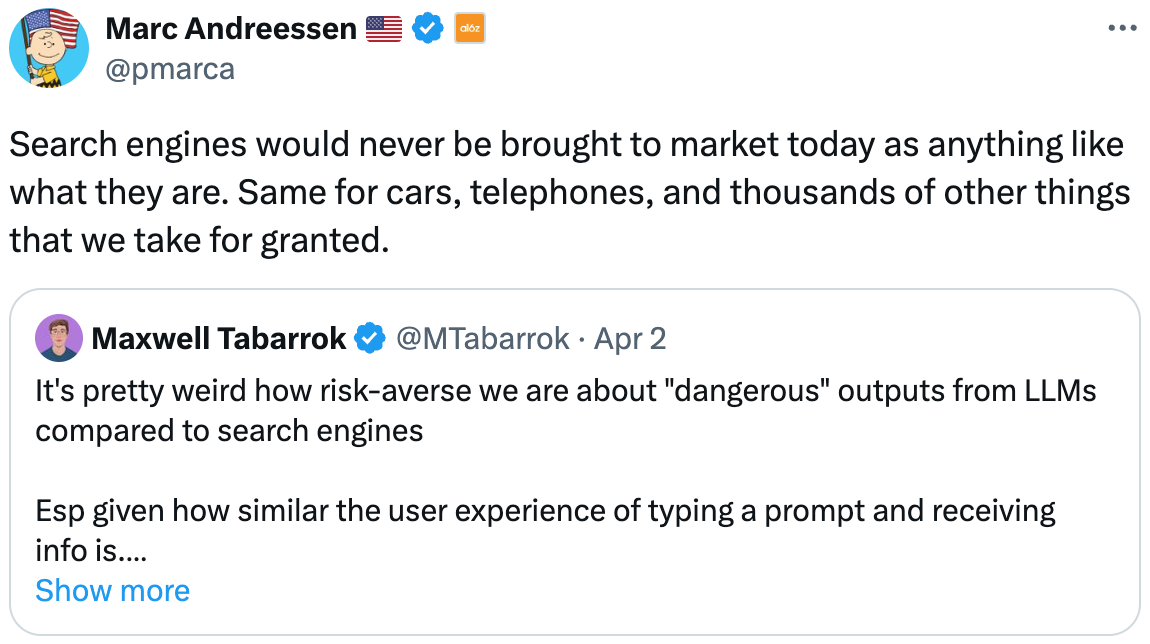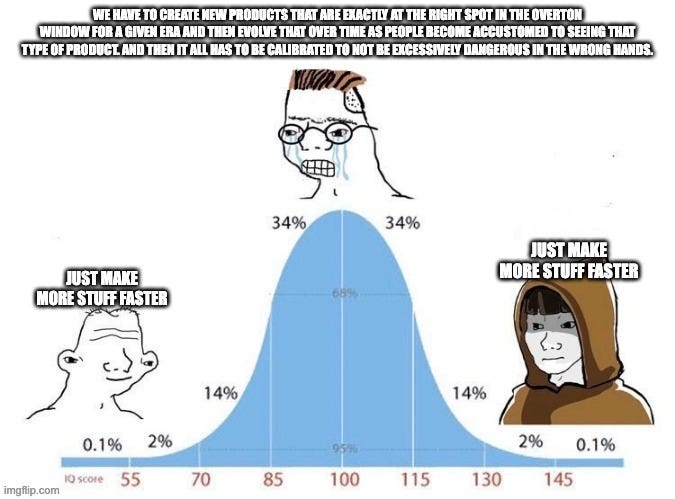OSD 268: Guns as effective accelerationism
The answer is always to keep innovating.
We talk a lot here about the idea that underpins the entire disagreement about gun rights: the assumption that because guns are dangerous, they are bad. Historically, gun rights advocacy focused on convincing people that guns (or at least the “good” guns) weren’t dangerous. That failed because it’s obviously false, and the failure culminated with 1994’s volley of assault weapons bans.
The modern gun rights movement has taken a different angle: “Yes, guns are dangerous — and that’s good.” That has worked much better:
People think of guns as special in this regard. A uniquely hot hot button. Why can’t guns be uncontroversial like all those other powerful-but-beloved technologies like phones and the internet?
Well, two reasons:
New stuff is controversial when it’s new. “OSD 168: There’s nothing new under the gun” describes how dime novels and bicycles were thought to be corrupting the youth back in the day. Remember the Senate hearings about Mortal Kombat? As for the internet, remember the Clipper chip?
To the extent that internet tech has escaped controversy in the past, it’s because the people in a position to push back on it thought it was a cute toy. As soon as they realize it can have real-world effects they don’t like, they change their mind about it real quick.
Let’s dive into that second point more.
Marc Andreessen posted this last week:
If search engines were invented today, we’d be having lengthy debates about search engine alignment. But in 1998, when Google launched, there was no controversy. It gives you what you search for, and that is cool, end of story.
If motorcycles were invented today, how many hours would that invention last before it got banned? The real blackpill is that it wouldn’t even need to be banned, since all new vehicles are presumptively illegal until and unless they go through an approval process. One of many domains where everything is forbidden unless it’s specifically allowed, an inversion of traditional American law.
Why do things play out one way or the other?
A new technology catches the eye of Sauron once it becomes clear that the tech is powerful enough to be dangerous. So whether it gets banned comes down to how powerful it can get before anybody notices.
From “OSD 246: Eroom’s law”:
What Eroom’s law and similar patterns (e.g. this image from a post by Elad Gill) hint at is that regulation and innovation are at odds. More regulation leads to less innovation. But the corollary also holds: more innovation leads to less regulation. That’s not obvious at first. After all, it’s the incredible pace of AI innovation that’s driving the calls to squash it, and ditto for 3D printing of guns. But in all such cases, the way to protect innovation against the restrictionist impulse is to innovate even more.
Innovation creates facts on the ground, and creators can move a lot faster than restrictionists can. Uber exists today because Travis Kalanick decided not to ask taxi regulators for permission. Ditto 3D-printed guns. Ditto the AR accessory market. Ditto, perhaps, AI.
It’s a race. The impact of the tech has to reach escape velocity before people notice. Then once they do notice, the cat is already out of the bag.
The lesson for gun rights then is no different than how Uber, as a scrappy startup, singlehandedly destroyed every century-old taxi cartel in the world: always be moving faster. An OSD Discord subscriber, @Hoffnung, pointed out “1. The AWB compliance parts market, 2. The meteoric rise of 3D prints from proof of concept to fairly practical handguns, SMGs/carbines, and rifles” as good concrete examples here. Same deal with pistol braces, which revolutionized the civilian carbine market.
The “just innovate” ethos also speaks to the ethos underlying gun rights, which is that decentralized power and decision-making is the best way to solve emergencies. More innovation for more people, faster. Even when — especially when — people are shouting that it’s too dangerous and has to be centralized.
Guns are the original e/acc.
This week’s links
For seven months, the DC police ran the only FFL in the city. It didn’t go great.
Although it’s not clear that the article’s stats about “crime guns” are actually well-substantiated.
Massachusetts State Police robot dog shot during standoff
Plays MIDI version of “Taps”.
OSD’s own Chuck Rossi on Gunbroker’s podcast
With Brad Luttrell from GoWild.
More about Open Source Defense
Merch
Rep OSD.
OSD Discord server
If you like this newsletter and want to talk live with the people behind it, join the Discord server. The OSD team is there along with tons of readers. See you there.







> A new technology catches the eye of Sauron once it becomes clear that the tech is powerful enough to be dangerous.
AI is a perfect example of this.
IDK why but I assume there's a large overlap between the readership of this blog and (the cool parts) of the lesswrong community. But, so, lesswrong community online among other things has been freaking out about "AI risk" for 20 years now. And nobody cared, and everyone thought they were weird, and ignored them.
Then, suddenly, AI becomes a useful thing, and Sam Bankman-Fried is briefly one of the richest in the world. And then Power starts doing what it does, and notices, and freaks out, and attempts (and, from my point of view, has overwhelmingly succeeded) to take it over.
> If search engines were invented today, we’d be having lengthy debates about search engine alignment.
Idle thought, but, we kind of _do_ have those lengthy debates these days. That's half of what "Trust and Safety" _does_ at Google, is making sure the search engine results are "aligned" with what they think is correct.